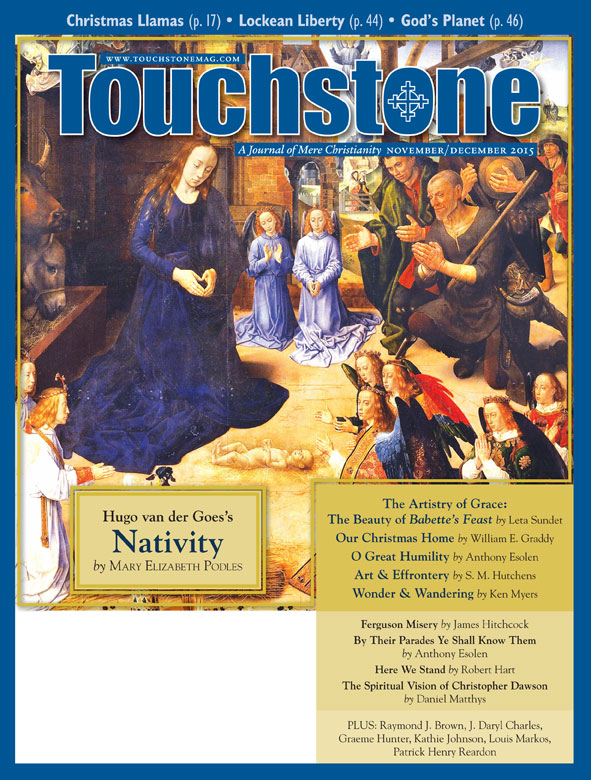View
Advent Teufel & Llama Cookies
Rebecca Sicree on Preparing for Christmas in a Shipwrecked Culture
"We should do this every day," my daughter Genny informed me. It was the morning of December 6th, the feast of St. Nicholas. The night before, my children had filled their shoes with carrots and apples for St. Nicholas's horse and lined them up outside our front door. This morning they had found them filled with chocolate coins wrapped in gold foil, along with a letter from St. Nicholas.
"Now, Genny," I chided her, "wouldn't you get tired of chocolate coins if you got them every morning?"
"Oh, no, it's not that," Genny replied. "It's just that this way we can always find our shoes."
The Advent Teufel
With ten children, our house has always been, as my husband the chemist puts it, "an experiment in entropy," but never more so than around Christmastime. I have always felt guilty about this. Years ago I read an article about the Advent Teufel, a devil from German folklore who kept people so busy with preparations for Christmas that they forgot its real meaning. Not being German, I don't know whether the Advent Teufel exists outside of the people's imagination, but I still worry, sometimes, about whether my family is falling into his traps.
We don't, you see, just celebrate Christmas traditions we inherited from our families. We borrow old ones from other countries, like the Dutch custom of putting out shoes for St. Nicholas and his horse. And we keep acquiring new ones, like baking llama cookies. In fact, our family does the exact opposite of what everyone advises, which is to slow down and simplify your life so you can have a peaceful, spiritual Christmas.
Twelve Days of Dinosaurs
I didn't deliberately set out to complicate our lives, you understand. I had always loved reading about Christmas traditions from around the world, and I wanted my children to enjoy them for real, and not just in a book.
I didn't try to recreate all of them, of course. My husband, for example, allowed me to give our children one small present a day for all twelve days of Christmas exactly once, back when we had only two children. Then, possibly foreseeing that ten children times twelve days would equal 120 presents a year and that toy cars and dinosaurs would be swarming over our living room like army ants, he put his foot down, and I abandoned the Twelve Days of Presents forever. (My living room was overrun by toy dinosaurs anyway, but at least it took longer.)
The Crown of Fire
Chocolate coins, unlike toy dinosaurs, do not migrate in herds throughout your house, so we added the celebration of St. Nicholas's Day with no ill effects. Celebrating St. Lucy's Day was more complicated. In Sweden, St. Lucy arrives before sunrise on her feast day, December 13th, to prepare the way for Christmas. While the family waits in the dark down below, she descends the staircase, disguised as the eldest daughter, dressed in white, crowned with a wreath of candles, and bearing saffron buns for breakfast.
I had always thought that this tradition was beautiful, but my experience with Advent wreaths led me to be cautious: my five boys have done everything from toasting pieces of bread over the Advent candles to squeezing lemon rinds at the flames to make them erupt. (I learned how flammable lemon oil is when my husband showed me this trick on a date. I have no doubt from whom our boys learned it.) So when I first lit the wreaths in my daughter's hair, I used glow sticks as substitutes for candles.
One year, however, we ran out of glow sticks, so we were forced to use candles as substitutes for the glow sticks that were substitutes for the candles. The difference was so dramatic—St. Lucy now had a radiant halo instead of a ghostly aura—that we never went back. I reasoned that if the modern-day descendants of the Vikings, who have banned spanking in Sweden, have not also seen fit to ban lit candles for St. Lucy's crown, they couldn't be that dangerous.
The reason they aren't, of course, is that we are dealing with girls here. Given the chance to look beautiful and make a dramatic entrance, few girls are tempted to turn St. Lucy's crown into St. Catherine's wheel and send it careening down the stairs instead. We do require, however, that St. Lucy put out her crown and not smoke during breakfast.
The Cranberry Litany
After St. Lucy's descent, my children and I all chant the Cranberry Litany. The first child begins by chanting, "Do I have to eat the dried cranberries on the bun?" and I chant back, "Yes, you do." Then the child chants, "Do I have to eat them if they fall off on my plate?" and I chant back, "Yes, you do." Then the child chants, "Do I have to eat them if Tommy puts all of his on my plate?" and I chant back, "No, you don't." Then the litany switches to the next child, who repeats it. After the last child finishes, I remind myself that St. Lucy died a martyr and finish off all the dried cranberries.
Water Buffalo & Llama Cookies
Our Christmas preparations grew more complicated as our children entered our parish middle school, which requires them to do an Advent project every year. The students can do almost any project they wish, "just as long," their religion teacher sighs, "as they don't do it all on the bus the morning it is due."
Now when it comes to school projects, my boys are accomplished minimalists. My girls are not. So Tom made a Christmas card for a soldier stationed overseas. (He assures me that he did not finish it on the morning bus. That was his Lenten project.) Teresa, on the other hand, made an entire Native American nativity set out of clay. James made a poster of a Jesse tree.
Genny bought a water buffalo.
Fortunately, we did not have to fly to the Philippines to pick it out. But we did have to bake 600 cookies and sell them in the school cafeteria to pay for one. So Heifer International got a check, a Filipino family got a new water buffalo, and Genny got an "A" on her Advent project. She was happy. "Next year," she told me, "I want to buy llamas."
Which is why we spent the next Advent baking one thousand llama cookies. Because Genny had to go to class from time to time, I had to sit in the school cafeteria covering for her. Children were curious about the llama cookies. I had to explain why they were not shaped like llamas. I had to explain that our school was not going to get any llamas. I had to explain that the llamas were not going to get any cookies. I had to explain that the llamas were not actually ingredients in the llama cookies. But eventually, enough llama cookies sold that Genny was able to buy a llama each for two Bolivian families, with enough money left over for six rabbits. (The Heifer International catalog showed a smiling boy cuddling a new bunny. The catalog called it a "protein source." We refrained from explaining this to the grade-schoolers.)
We did not bake any Christmas cookies for our family those two years. Sometimes one Christmas tradition cancels out another one.
The Play's the Thing
But our most time-consuming Christmas tradition did not come from a book or even a school project. It started when we hosted a Twelfth Night party in our parish hall at the end of the Christmas season. We learned then that nothing complicates your life like success. Guests at our first party immediately asked us to hold another one the next year. The only problem was that the highlight of our party had been an English mummers' play, The Turkey and the Turk, written by G. K. Chesterton, who had, most inconsiderately, never written another one. So now I not only had to plan a party, but also write a new play for it.
And do it again the next year. Over the last three years, the cast has expanded from five to sixteen actors as more and more of our children's friends asked to be included. The plot, which everyone expects to include all the successful elements of the previous plays, now has to incorporate not only a sword fight, but also a food fight with stale French bread and rubber chickens, not to mention jokes from actors wearing animal-head masks. I've been informed that the next play has to include Sherlock Holmes and an encore for the remote-controlled rat.
Salvaging Christmas
But does all this activity help celebrate the birth of Christ? In an unexpected way, yes, it does. A mummers' play, unlike a nativity pageant, is nothing but pure entertainment, but it does give the lie to the accusation that religious people don't know how to enjoy life. I always wanted our children to know that we celebrated more because of our faith, not less.
I know it may seem strange, and a little artificial, for a family to celebrate Dutch and Swedish and English Christmas customs, when we have only traces of Dutch ancestry and no Swedish or English at all, but when you live in a country that is increasingly at war with Christian culture, you have to salvage what customs you can to create a family life that defends the faith. For cultures can run aground as well as ships, and in both cases the survivors end up with odd, mixed-up results, just like the Swiss Family Robinson having a piano in their tree-house.
Christian culture is important, not just because it is how we live out our faith, but also because culture can precede faith and prepare the way for it. Chesterton wrote, "The great majority of people will go on observing forms that cannot be explained; they will keep Christmas Day with Christmas gifts and Christmas benedictions; they will continue to do it; and some day suddenly wake up and discover why." This is why hospitality is more important now than ever: as more and more of Christian culture is banned from public life, the only place some people may ever encounter it is in Christian homes. When Christ first sent out his disciples without money or staff or sandals, he made the spread of the gospel completely dependent on hospitality. It may become that way yet again.
The Devil in the Details
Germans aren't the only people with traditions about devils in Advent. Mexicans have them, too. During the nine days of Las Posadas, Mexican carolers go door-to-door, reenacting Mary and Joseph's search for shelter. All this time actors dressed as devils jeer at them from windows and rooftops, urging the people of Bethlehem to turn them away. Just as the German Teufel tempts us to neglect our prayer life, the Mexican diablos tempt us to neglect hospitality.
We can do too much during Advent, but we can also do too little. •
Rebecca Sicree writes from Boalsburg, Pennsylvania. She and her family attend Our Lady of Victory Catholic Church in nearby State College. She and her husband Andrew have ten children, six of whom are now adults.
subscription options
Order
Print/Online Subscription

Get six issues (one year) of Touchstone PLUS full online access including pdf downloads for only $39.95. That's only $3.34 per month!
Order
Online Only
Subscription

Get a one-year full-access subscription to the Touchstone online archives for only $19.95. That's only $1.66 per month!
bulk subscriptions
Order Touchstone subscriptions in bulk and save $10 per sub! Each subscription includes 6 issues of Touchstone plus full online access to touchstonemag.com—including archives, videos, and pdf downloads of recent issues for only $29.95 each! Great for churches or study groups.
Transactions will be processed on a secure server.
more on culture from the online archives
more from the online archives
calling all readers
Please Donate
"There are magazines worth reading but few worth saving . . . Touchstone is just such a magazine."
—Alice von Hildebrand
"Here we do not concede one square millimeter of territory to falsehood, folly, contemporary sentimentality, or fashion. We speak the truth, and let God be our judge. . . . Touchstone is the one committedly Christian conservative journal."
—Anthony Esolen, Touchstone senior editor













